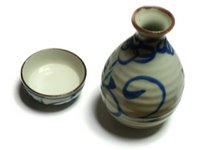authenticity
 It had been a trying day. Stress kept me awake 'til well into the AM, and I watched a rather large house spider narrowly escape the clutches of my dutiful house cat/bug slayer (it was quite a battle of wills). I sought the solace of my oasis within this oasis that lies in the blistering and barren Sacramento Valley. The heat blazed near 100 (95 to be exact), we had to load in magazines from a stuffy truck and off two more skids at the door; record labels changed artist schedules at the last moment (literally), and I was forced to dump a photo shoot I'd spent weeks arranging in favor of press shots; stories aren't coming in as fast as I'd like, and I'm wondering if I'm just being ruthlessly anal.
It had been a trying day. Stress kept me awake 'til well into the AM, and I watched a rather large house spider narrowly escape the clutches of my dutiful house cat/bug slayer (it was quite a battle of wills). I sought the solace of my oasis within this oasis that lies in the blistering and barren Sacramento Valley. The heat blazed near 100 (95 to be exact), we had to load in magazines from a stuffy truck and off two more skids at the door; record labels changed artist schedules at the last moment (literally), and I was forced to dump a photo shoot I'd spent weeks arranging in favor of press shots; stories aren't coming in as fast as I'd like, and I'm wondering if I'm just being ruthlessly anal.Things got better when on my desk I found the re-issue of Boston's first album, which was quickly ushered to the CD stereo and blared at an office-friendly volume (not nearly as loud as that album deserves to be played). But still, I needed more, so I went to my home away from home, the Chinese Restaurant on Second. This time, however, its soothing atmosphere was disrupted by a group of two college couples who--rightfully so--were celebrating the end of the school year. They were loud, and drunk, and by all accounts, douchebags, but douchebags are people too and have the same rights as the rest of us.
They must have just sat down to eat when I arrived. Plates of yummy food piled high were brought out by the diminutive waitresses. One of the women at the table asked for chopsticks. "We like to do it the authentic way," she said.
They ate their dinner and spoke at high volume, but mostly, they drank. Tsing Tao beers all around and, of course, warm bottles of sake. Oh, but you're thinking sake is more associated Japanese cuisine, right? Well it is. Because that's where it's from. But the Chinese Restaurant serves sake. I wanted to look it up, and the article on Wikipedia mentioned there is one theory that sake was originally developed in China and brought to Japan. It also mentioned the popularity of sake in Japan. These are both pretty good reasons why you may find sake in Chinese restaurants. However, I think in this case, sake is served at The Chinese Restaurant because enough douchebags who didn't know there was a difference between Chinese and Japanese kept coming in asking for it. Case in point:
The normally somber and reserved staff at The Chinese Restaurant seemed somewhat invigorated by the young party monsters. Their zealousness for an authentic sake-accented Chinese dining experience included the traditional sake bomb, which involves dropping the little cup of sake into half a beer and chugging the whole thing down. Each sake bomb was preceded by a chant and a pounding on the table. Before the fourth or fifth round of drunken cacophony, the Matron of the restaurant came over and taught them a new chant: "Yee, uhr, sahn. Sake sake sake bomb!" Yee, uhr, sahn, she instructed, is Chinese for one, two, three. The douchebags had problems spitting this out. Sometimes they'd say sake twice, other times, they'd say it four...ice. Sometimes they'd leave out an uhr or a yee. They certainly had plenty of practice, and the wait staff watched on with glee.
At one point, one of the waitresses walked by the rowdy table and shouted out something to the Matron in Chinese (from watching plenty of subtitled movies, I can hear the differences between Mandarin and Cantonese, but I'm still not sure which is which), and one of the drunken dude douchebags shouted out, "Hey! I know what you're saying!" To which, most in the restaurant gave a chuckle. "I can speak Japanese," he added. "They're not Japanese, they're Chine..." said the woman at the table who had been acting as the voice of reason, but she trailed off in a loud whisper toward the end of the word, and the room got rather silent.
My fortune read that I should contact a loved one who was living a far distance from me.

2 comments:
All signs point east, yo. Get your ass back on the right coast.
I live far away and am loved!!
...but it's probably referring to your mom...she lives farther away.
Post a Comment